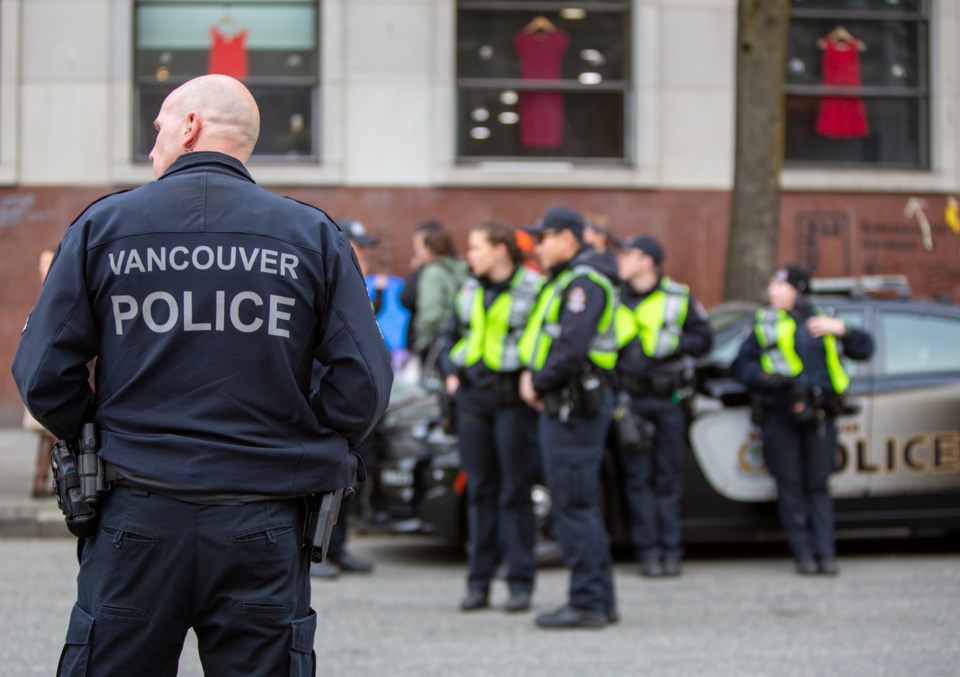A survey conducted by Canada’s largest independent research and analytics firm has found 84 per cent of respondents believe the Vancouver Police Department is doing “an excellent, good or average” job.
At the same time, Leger’s findings showed the satisfaction rating is 53.5 per cent when only including responses from people who self-identified as Indigenous. Black respondents gave a 77 per cent rating.
The data was mined from 1,755 people, including 150 who answered in Cantonese, Mandarin, Punjabi, Tagalog or French. The survey was conducted online in November 2022 and between April 28 and May 4 of this year.
Results of the survey were summarized in a VPD report that went before the Vancouver Police Board Thursday. The report doesn’t provide further detail or an explanation on why Indigenous and Black respondents were less satisfied with police.
But the report said “caution is required when interpreting these disaggregated survey results, as some of them are based on a small number of respondents and are therefore subject to a large amount of statistical uncertainty.”
The department will not release the full data set from the survey, citing privacy concerns.
Crime victims
Of the Indigenous respondents, 52.3 per cent said they had been a victim of crime in the past year. The percentage was slightly higher — 54.8 per cent — among Black respondents. The report doesn’t say what the percentages equate to in terms of actual numbers of people.
Board member Faye Wightman questioned the methodology of the survey, noting it only served people with access to a computer. Wightman successfully requested next year’s survey be structured beyond online feedback and include phone calls and focus groups.
“Not everyone's able to respond to an online panel, typically vulnerable populations,” she said.
Wightman’s motion was supported by Mayor Ken Sim, who doubles as chairperson of the board. Sim, who was elected mayor in October 2022, referred to his campaign when commenting on the rationale for widening the ways on how responses are collected.
“I remember during the last election, there were other survey companies that did all their surveys online and missed half the population, so we [get] a completely different view of what's actually going on,” the mayor said.
Indigenous peoples
Vulnerable people, in this case, would include Indigenous peoples, who are overrepresented in homeless counts and overdose deaths, as reports from city staff, the BC Coroners Service and First Nations Health Authority have shown in recent years.
A separate VPD report that went before the police board Thursday showed that Indigenous women between the ages of 35 and 64 were almost 12 more times the victims of crime than any other race over the past 12 months in Vancouver.
Indigenous men in the same age category were almost five more times the victims of crime.
The data is information the VPD now includes in its crime statistic reports, with Glacier Media reporting in April on the first shared data set, which showed Indigenous girls under 18 years old were the most overrepresented victims of violence in Vancouver over a previous 12-month period.
The VPD has various programs dedicated to improving relations with Indigenous peoples, as Glacier Media has previously reported. In August 2021, the department created the African Descent advisory committee, which includes Black leaders and former police officers.
Hate crime investigators
The department is also the only municipal police service in B.C. that has full-time officers dedicated to hate crime investigations within the city it serves. The officers provide training to all frontline officers and have been successful in tying hate to crimes such as assaults.
For example, a Black person was assaulted in May 2022 near West Hastings and Homer streets.
According to a VPD report, investigators worked closely with the Black community and Crown counsel “to present compelling evidence that led the judge to conclude that the only motive for the assault was the colour of the victim’s skin.”
The results of the survey regarding Indigenous and Black people are not uncommon findings when compared to a City of Vancouver employee survey conducted in the spring of 2021.
The voluntary, confidential electronic survey administered by BC Stats on behalf of the city found that Indigenous and Black workers — along with people with disabilities and those who identify as non-binary, gender-fluid and trans — rated their experiences in the workplace lower than the average respondent on virtually every question asked.
The survey received 3,732 responses from employees, a 55 per cent response rate.
The VPD, Vancouver Fire and Rescue Services and Vancouver Public Library conducted similar and parallel exercises, but the results were not reflected in the data.
'Crime had gotten worse'
Leger’s respondents were people who were living, working or regularly visiting Vancouver at the time the survey was conducted. This sample included 210 people who owned or managed a business in Vancouver.
Some of the findings:
• 15 per cent self-reported being a victim of a crime in the previous 12 months. The VPD says this is consistent with the 2018 and 2019 VPD community satisfaction surveys.
• 19 per cent were dissatisfied with their experience calling 911. This service is operated by E-Comm, the designated “public safety answer point” for most B.C. communities.
• 25 per cent were dissatisfied with their experience calling the VPD’s non-emergency line. This service is also operated by E-Comm.
• 31 per cent of those working or conducting business in Vancouver hired security, 29 per cent had customers afraid to visit and 27 per cent had staff afraid to come to work.
• 42 per cent changed their routines due to crime concerns. Many said they avoided the Downtown Eastside, Chinatown and Gastown areas specifically.
• 67 per cent believed that crime had gotten worse compared to the previous year.
• 77 per cent were concerned about crime in Vancouver.
• 84 per cent thought the VPD was doing an “excellent, good, or average job.”





